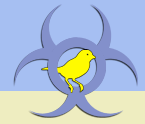Database Description
The Canary Database is a compilation of curated peer-reviewed
research articles related to the use of animals as sentinels
of human health hazards. This database contains information
added by trained curators in addition to bibliographic records
from MEDLINE and other well-known databases.
The database includes studies of wildlife, companion, and
livestock animals, where either the exposure or the health effect
could be considered potentially relevant to human health.
For a complete list of database fields, see our Glossary.
What Curators Add
For each study, curators add information about animal species,
exposures, health effects, location, and whether the study
includes data providing evidence linking animal sentinel events
to human health risk in the following ways:
-
Exposure-effect relationships in the animal
-
Shared exposures between human and non-human animals
-
Interspecies susceptibility
-
Linkage between animal and human health outcomes
-
Gene sequence information
Suggested Uses
Use the Canary Database to:
-
Find out whether a cause and effect relationship between an
environmental hazard and a health outcome has been studied in
animal populations
-
Find out what is known about a particular disease reservoir
for an infectious agent
-
Find out how investigators have used different study methodologies
-
Identify knowledge gaps related to animal sentinel health events
|

